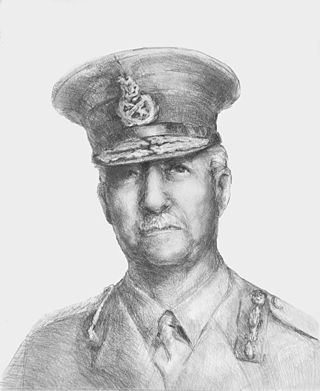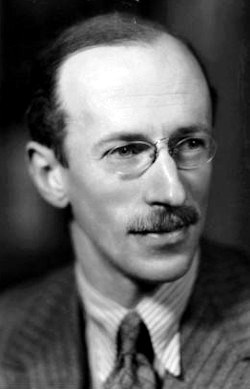Related Research Articles

Major-General John Frederick Charles "Boney" Fuller was a senior British Army officer, military historian, and strategist, known as an early theorist of modern armoured warfare, including categorising principles of warfare. With 45 books and many articles, he was a highly prolific author whose ideas reached army officers and the interested public. He explored the business of fighting, in terms of the relationship between warfare and social, political, and economic factors in the civilian sector. Fuller emphasised the potential of new weapons, especially tanks and aircraft, to stun a surprised enemy psychologically.

Field Marshal William Edmund Ironside, 1st Baron Ironside, was a senior officer of the British Army who served as Chief of the Imperial General Staff during the first year of the Second World War.

Lieutenant General Sir Henry Royds Pownall, was a senior British Army officer who held several command and staff positions during the Second World War. In particular, he was chief of staff to the British Expeditionary Force (BEF) in France and Belgium until the battle of France in May/June 1940. He was later chief of staff to General Sir Archibald Wavell until the fall of Singapore in February 1942, and was then chief of staff to Admiral Lord Louis Mountbatten in South East Asia in 1943–1944.

"Lions led by donkeys" is a phrase used to imply a capable group of individuals are incompetently led. Coined in classical antiquity, the phrase was commonly used after World War I to describe senior commanders of militaries which participated in the war, most prominently those of the British Armed Forces. The historiography of the United Kingdom during the 20th century frequently described the infantry of the British Army as brave soldiers (lions) being sent to their deaths by incompetent and indifferent commanders (donkeys).

Sir Michael Eliot Howard was an English military historian, formerly Chichele Professor of the History of War, Honorary Fellow of All Souls College, Regius Professor of Modern History at the University of Oxford, Robert A. Lovett Professor of Military and Naval History at Yale University, and founder of the Department of War Studies, King's College London. In 1958, he co-founded the International Institute for Strategic Studies.

General Sir Walter Mervyn St George Kirke, was the Commander in Chief of the British Home Forces during the Second World War.

Henry Spenser Wilkinson was the first Chichele Professor of Military History at Oxford University. While he was an English writer known primarily for his work on military subjects, he had wide interests. Earlier in his career he was the drama critic for London's Morning Post.

Geoffrey Till is a British naval historian and emeritus Professor of Maritime Studies in the Defence Studies Department of King's College London. He is the Director of the Corbett Centre for Maritime Policy Studies.
Norman Henry Gibbs was Chichele Professor of the History of War at Oxford University for 24 years from 1953 to 1977, the longest tenure of all who have held the chair since its establishment in 1909.
Brian Oliver Murdoch is a British philologist who is Emeritus Professor of German at the University of Stirling. He specializes in the study of early Germanic and Celtic literature, on which he has authored and edited several influential works.

Lieutenant-General Sir Lionel Vivian Bond, was a senior officer in the British Army.
Bryan Ranft was a historian of the Royal Navy, who served as Professor of History and International Affairs at the Royal Naval College, Greenwich, 1967–1977.

Sir Basil Henry Liddell Hart, commonly known throughout most of his career as Captain B. H. Liddell Hart, was a British soldier, military historian, and military theorist. He wrote a series of military histories that proved influential among strategists. Arguing that frontal assault was bound to fail at great cost in lives, as proven in World War I, he recommended the "indirect approach" and reliance on fast-moving armoured formations.

Keith John Jeffery MRIA was a Northern Irish historian specialising in modern British, British Imperial, and Irish history.

The Department of War Studies (DWS) is an academic department in the School of Security Studies within the Faculty of Social Science & Public Policy at King's College London in London, United Kingdom. Along with other politics and international studies units at King's College London, it ranks amongst the top places for international relations in the world. For international relations in the UK, which is taught within the War Studies Department and the Department of European & International Studies, King's ranks second nationally. The department is devoted to the multi-disciplinary study of war and diplomacy within the broad remit of international relations. It remains one of the only academic departments in the world that can be described as such.

The Royal Army Medical College (RAMC) was located on a site south of the Tate Gallery (now known as Tate Britain) on Millbank, in Westminster, London, overlooking the River Thames. The college moved from the site in 1999 and the buildings are now occupied by the Chelsea College of Arts. The area around the college including the Tate, former military hospital and other adjacent areas is a conservation area. The former college buildings are now listed.
Harry Cranbrook Allen was a British historian of the United States.
Abiodun Alao is a Nigerian academic and professor of African studies at King’s College London and the programme director of the African Leadership Centre. He is also the chair of the King’s College London Africa Community of Practice and between December 2013 and August 2015 held a visiting professorship position at the Nigerian Defence Academy, Kaduna, Nigeria. He is the author of A New Narrative for Africa: Voice and Agency, which "examines the perception of Africa in the global system, tracing Africa’s transition from a "problem" to be solved into an agent with a rising voice in the world."
Brian Holden-Reid is a British military historian.
Alexander Danchev was a British historian, biographer, and army officer. His work ranged from military history to the lives of artists. His originality stems from a vast erudition put at the service of a cross-understanding of disparate fields such as art and war.
References
- ↑ Introduction to Liddell Hart: a study of his military thought. London: Cassell, 1977
- ↑ See introduction to "The unquiet Western Front", thanking his "wife Madeleine"
- ↑ https://www.smh-hq.org/docs/HQG/GazetteSP23.pdf
- ↑ Contemporary authors